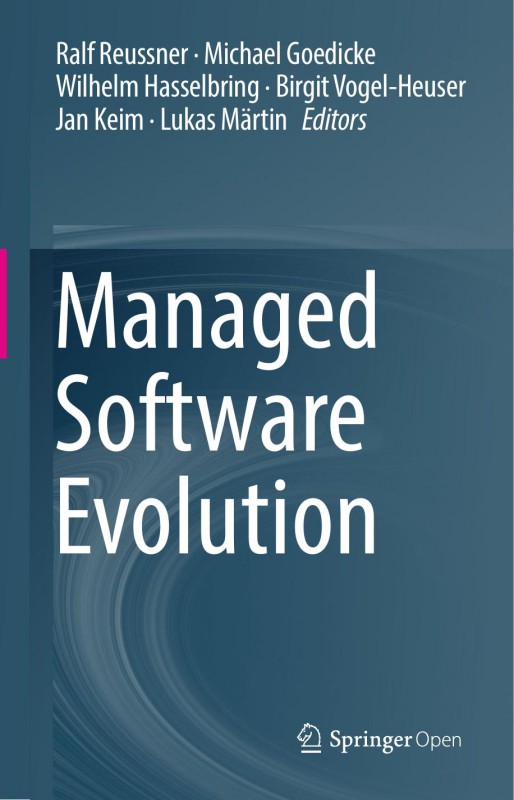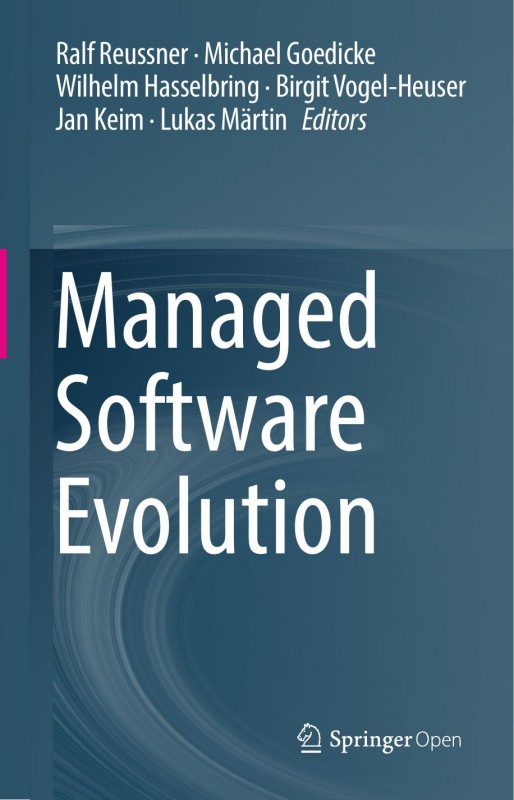Managed Software Evolution 1st edition by Ralf Reussner, Michael Goedicke, Wilhelm Hasselbring, Birgit Vogel Heuser, Jan Keim, Lukas Märtin ISBN 3030134989   978-3030134983
$50.00 Original price was: $50.00.$25.00Current price is: $25.00.
Authors:Ralf Reussner · Michael Goedicke , Series:Computer Science [200] , Author sort:Goedicke, Ralf Reussner · Michael , Languages:Languages:eng , Published:Published:Jun 2019 , Publisher:Springer
Managed Software Evolution 1st edition by Ralf Reussner, Michael Goedicke, Wilhelm Hasselbring, Birgit Vogel Heuser, Jan Keim, Lukas Märtin – Ebook PDF Instant Download/Delivery. 3030134989 978-3030134983
Full download Managed Software Evolution 1st edition after payment

Product details:
ISBN 10: 3030134989
ISBN 13: 978-3030134983
Author: Ralf Reussner, Michael Goedicke, Wilhelm Hasselbring, Birgit Vogel Heuser, Jan Keim, Lukas Märtin
This open access book presents the outcomes of the “Design for Future – Managed Software Evolution” priority program 1593, which was launched by the German Research Foundation (“Deutsche Forschungsgemeinschaft (DFG)”) to develop new approaches to software engineering with a specific focus on long-lived software systems. The different lifecycles of software and hardware platforms lead to interoperability problems in such systems. Instead of separating the development, adaptation and evolution of software and its platforms, as well as aspects like operation, monitoring and maintenance, they should all be integrated into one overarching process.
Accordingly, the book is split into three major parts, the first of which includes an introduction to the nature of software evolution, followed by an overview of the specific challenges and a general introduction to the case studies used in the project. The second part of the book consists of the main chapters on knowledge carrying software, and cover tacit knowledge in software evolution, continuous design decision support, model-based round-trip engineering for software product lines, performance analysis strategies, maintaining security in software evolution, learning from evolution for evolution, and formal verification of evolutionary changes. In turn, the last part of the book presents key findings and spin-offs. The individual chapters there describe various case studies, along with their benefits, deliverables and the respective lessons learned. An overview of future research topics rounds out the coverage.
The book was mainly written for scientific researchers and advanced professionals with an academic background. They will benefit from its comprehensive treatment of various topics related to problems that are now gaining in importance, given the higher costs for maintenance and evolution in comparison to the initial development, and the fact that today, most software is not developed from scratch, but as part of a continuum of former and future releases.
Managed Software Evolution 1st Table of contents:
Preface
- Introduction to the concept of software evolution
- Importance of managing software evolution
- Scope and structure of the book
Part I: Introduction to Software Evolution
Chapter 1: The Nature of Software Evolution
- The challenges of evolving software
- Software lifecycle and maintenance
- Key concepts: software aging, technical debt, and refactoring
Chapter 2: Evolution Models and Theories
- Theoretical frameworks for software evolution
- Predictive models for software change
- Evolution in the context of agile and traditional methodologies
Part II: Managing Software Evolution
Chapter 3: Change Management in Software Development
- The role of change management in software evolution
- Version control systems and branching strategies
- Handling requirements changes and feature creep
Chapter 4: Software Maintenance and Upgrades
- Types of software maintenance: corrective, adaptive, perfective
- Strategies for maintaining and upgrading legacy systems
- Tools and practices for automated software updates
Chapter 5: Software Quality during Evolution
- Ensuring software quality through changes
- Testing and validation in evolutionary software
- Continuous integration and delivery in managing software evolution
Part III: Techniques and Tools for Managing Evolution
Chapter 6: Refactoring and Re-engineering
- The role of refactoring in software evolution
- Techniques for restructuring code without changing its functionality
- Re-engineering legacy systems for improved performance
Chapter 7: Tools for Software Evolution
- Integrated Development Environments (IDEs) for managing evolution
- Static analysis tools for tracking code changes
- Evolutionary design tools and frameworks
Part IV: Case Studies and Applications
Chapter 8: Case Studies in Software Evolution
- Real-world examples of software evolution and management
- Challenges faced by companies in managing software evolution
- Lessons learned from successful software evolution strategies
Chapter 9: Emerging Trends in Software Evolution
- Impact of cloud computing and microservices
- The rise of containerization and serverless architectures
- Machine learning and AI in managing software evolution
Part V: Future Directions and Conclusion
Chapter 10: The Future of Managed Software Evolution
- Predictions for the next decade in software management
- The evolving role of AI and automation in software evolution
- Best practices and strategies for future software managers
Appendices
- A. Glossary of Terms
- B. Recommended Reading
- C. Index
People also search for Managed Software Evolution 1st:
managed evolution
software evolution processes depend on
managed evolution a strategy for very large information systems
managed evolution – a strategy for very large information systems
evolution of managed services











